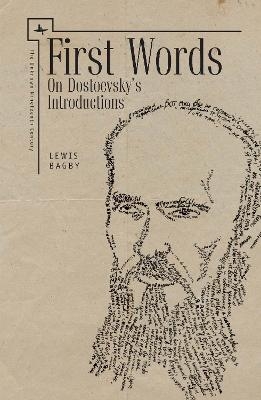
First Words
On Dostoevsky's Introductions
Seiten
2018
Academic Studies Press (Verlag)
978-1-61811-813-4 (ISBN)
Academic Studies Press (Verlag)
978-1-61811-813-4 (ISBN)
Dostoevsky attached introductions to his most challenging narratives. Despite his clever attempts to call his readers' attention to these introductions, they have been neglected as an object of study. That oversight is rectified in First Words, the first systematic study of Dostoevsky's introductions.
Dostoevsky attached introductions to his most challenging narratives, including Notes from the House of the Dead, Notes from Underground, The Devils, The Brothers Karamazov, and “A Gentle Creature.” Despite his clever attempts to call his readers’ attention to these introductions, they have been neglected as an object of study for over 150 years. That oversight is rectified in First Words, the first systematic study of Dostoevsky’s introductions. Using Genette’s typology of prefaces and Bakhtin’s notion of multiple voices, Lewis Bagby reveals just how important Dostoevsky’s first words are to his fiction. Dostoevsky’s ruses, verbal winks, and backward glances indicate a lively and imaginative author at earnest play in the field of literary discourse.
Dostoevsky attached introductions to his most challenging narratives, including Notes from the House of the Dead, Notes from Underground, The Devils, The Brothers Karamazov, and “A Gentle Creature.” Despite his clever attempts to call his readers’ attention to these introductions, they have been neglected as an object of study for over 150 years. That oversight is rectified in First Words, the first systematic study of Dostoevsky’s introductions. Using Genette’s typology of prefaces and Bakhtin’s notion of multiple voices, Lewis Bagby reveals just how important Dostoevsky’s first words are to his fiction. Dostoevsky’s ruses, verbal winks, and backward glances indicate a lively and imaginative author at earnest play in the field of literary discourse.
Lewis Bagby, Professor Emeritus of Russian, University of Wyoming, is the author of Alexander Bestuzhev-Marlinsky and Russian Byronism and editor of A Hero of Our Times: Critical Articles. He has published widely on Russian Romanticism, Tolstoy, Dostoevsky and Bakhtin.
Note on Transliteration
Acknowledgments
Introduction
Chapter 1: Model Prefaces from Russian Literature
Chapter 2: Dostoevsky’s Initial Post-Siberian Work
Chapter 3: Playing with Authorial Identities
Chapter 4: Monsters Roam the Text
Chapter 5: Re-Contextualizing Introductions
Chapter 6: Anxious to the End
Conclusion
Bibliography
Index
| Erscheinungsdatum | 19.06.2018 |
|---|---|
| Zusatzinfo | Illustrations |
| Verlagsort | Brighton |
| Sprache | englisch |
| Maße | 155 x 234 mm |
| Themenwelt | Geisteswissenschaften ► Sprach- / Literaturwissenschaft ► Anglistik / Amerikanistik |
| Geisteswissenschaften ► Sprach- / Literaturwissenschaft ► Literaturgeschichte | |
| Geisteswissenschaften ► Sprach- / Literaturwissenschaft ► Literaturwissenschaft | |
| Geisteswissenschaften ► Sprach- / Literaturwissenschaft ► Slavistik | |
| ISBN-10 | 1-61811-813-7 / 1618118137 |
| ISBN-13 | 978-1-61811-813-4 / 9781618118134 |
| Zustand | Neuware |
| Haben Sie eine Frage zum Produkt? |
Mehr entdecken
aus dem Bereich
aus dem Bereich
Poetik eines sozialen Urteils
Buch | Hardcover (2023)
De Gruyter (Verlag)
CHF 83,90
Buch | Softcover (2024)
belleville (Verlag)
CHF 27,95


